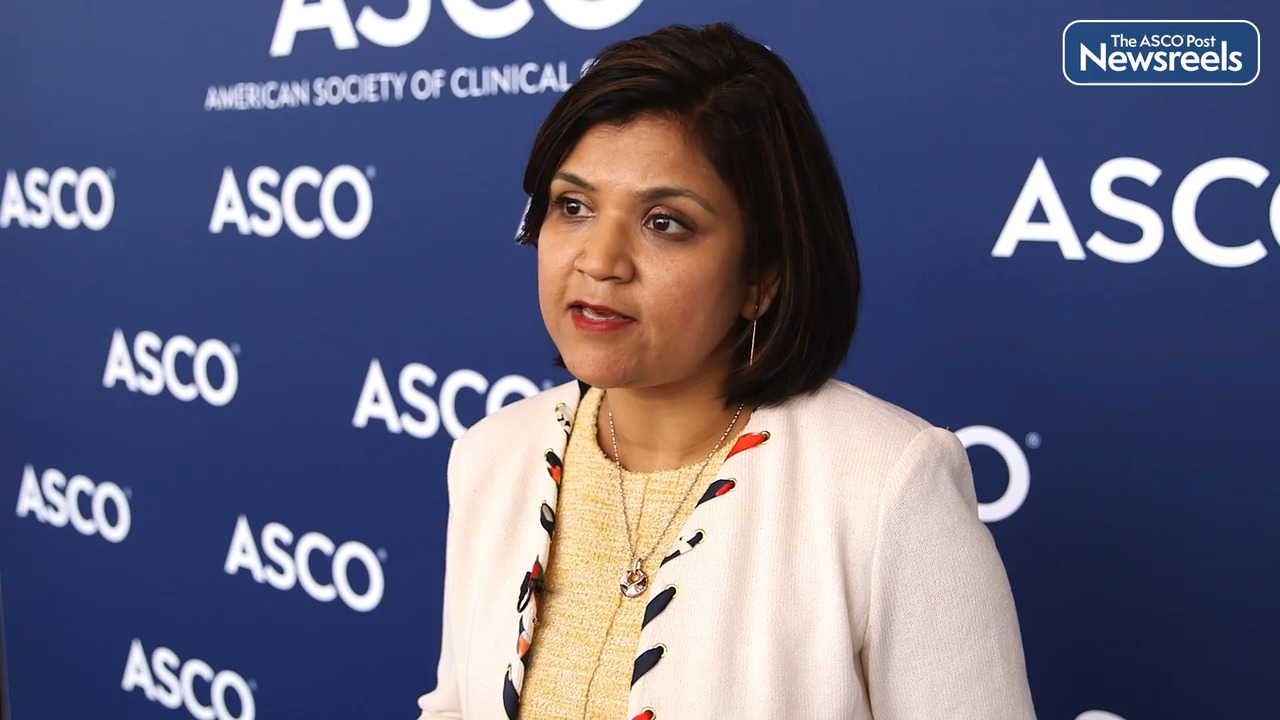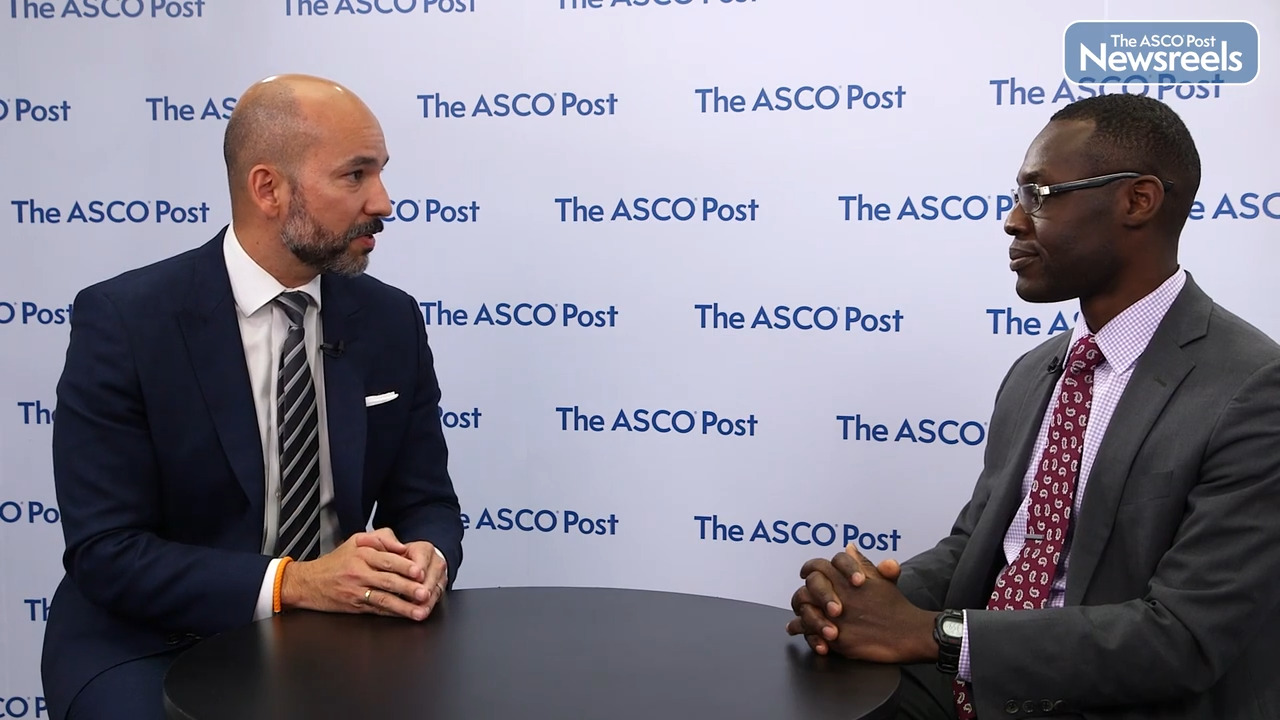Eunice S. Wang, MD, on AML: Long-Term Results With Crenolanib Plus Chemotherapy
2022 ASCO Annual Meeting
Eunice S. Wang, MD, of Roswell Park Comprehensive Cancer Center, discusses long-term phase II findings of a trial evaluating crenolanib plus chemotherapy in newly diagnosed adults with FLT3-mutant acute myeloid leukemia. The study showed a composite complete remission rate of 86%. With a median follow-up of 45 months, median overall survival has not been reached. A phase III trial is ongoing (Abstract 7007).
Transcript
Disclaimer: This video transcript has not been proofread or edited and may contain errors.
We designed a phase II clinical trial evaluating crenolanib added to standard 7+3 intensive chemotherapy for adults with newly diagnosed FLT3 AML. The purpose of this study was to examine the efficacy of adding this novel FLT3 tyrosine kinase inhibitor to standard intensive chemotherapy based on prior results of single agent crenolanib activity in heavily pretreated relapse and refractory FLT3 mutant adult patients. Crenolanib is a pan-FLT3 inhibitor with activity against both the active and inactive formations of FLT3 and has activity against both FLT3, ITD, and TKD mutations.
We designed this study to combine it with intensive chemotherapy, for which the standard of care is currently midostaurin plus 7+3 chemotherapy. A total of 44 patients were enrolled on this study, 29 younger than equal to 60 years of age, and 15 older than 60 years of age. 91% of patients had de novo disease, 75% with FLT3 ITD mutations and 18% with TKD mutations. Overall, patients were enrolled in standard intensive therapy with physicians choice of anthracycline, daunorubicin, or idarubicin plus infusional cytarabine for 7 days, followed by crenolanib started at 24 to 48 hours after chemotherapy and continued until 72 hours prior to next chemotherapy cycle. Patients were allowed to get consolidation with high-dose cytarabine or go on to transplantation, followed by 12 months of maintenance crenolanib following either chemo or transplant.
The overall remission rate in this trial was 86%. Younger patients younger than are equal to 60 years of age had a CR/CRI rate of 90%, and individual's greater than or equal to 60 years of age had an overall response rate of 80%. At 45 months of long-term follow up, the event-free survival for all 44 patients enrolled in this trial was 45 months. The median overall survival was not reached. In younger patients younger than 60 years of age, the median overall survival was not reached, with 71% of patients alive at 3 years after enrollment on this study. The overall cumulative rate of relapse in patients was 33%, and 15% in patients younger than 60. Of note, patients undergoing transplantation in this younger cohort had similar cumulative rate of relapse than patients getting chemotherapy alone.
In conclusion, we think that this combination regimen shows high efficacy, safety, and tolerability as compared to standard 7+3 plus midostaurin. A phase III trial of this combination approach is currently accruing using midostaurin 7+3 as its control arm. Results of this trial are eagerly awaited.
Related Videos
The ASCO Post Staff
Stephen M. Ansell, PhD, MD, of Mayo Clinic, discusses updated data from the ECHELON-1 trial, which showed that, when administered to patients with stage III or IV classical Hodgkin lymphoma, the combination of brentuximab vedotin, doxorubicin, vinblastine, and dacarbazine (A+AVD) vs doxorubicin, bleomycin, vinblastine, and dacarbazine resulted in a 41% reduction in the risk of death. These outcomes, says Dr. Ansell, confirm A+AVD as a preferred option for previously untreated disease (Abstract 7503).
The ASCO Post Staff
Shilpa Gupta, MD, of the Cleveland Clinic Foundation, discusses an updated consensus definition for standard therapy and clinical trial eligibility for patients with metastatic urothelial cancer who are platinum-ineligible, criteria that are proposed to guide treatment recommendations for this population. This may be especially important now that the U.S. Food and Drug Administration has restricted the use of first-line pembrolizumab to those who are considered platinum-ineligible (Abstract 4577).
Paul G. Richardson, MD, of Dana-Farber Cancer Institute, discusses phase III findings from the DETERMINATION trial, which showed that, for patients with newly diagnosed multiple myeloma, lenalidomide, bortezomib, and dexamethasone (RVd) with or without autologous stem cell transplant (ASCT) and lenalidomide maintenance to disease progression resulted in the longest median progression-free survival reported for each approach, and a highly significant difference in progression-free survival in favor of early transplant. While overall response rates were similar, rates of MRD favored early transplant also, but toxicity was greater and quality of life was transiently but significantly diminished. No overall survival advantage has been observed to date (Abstract LBA4).
The ASCO Post Staff
Alfredo Carrato, MD, PhD, of Alcala de Henares University in Spain, discusses phase II results from the SEQUENCE trial, which showed that nab-paclitaxel, gemcitabine, and modified FOLFOX showed significantly higher clinical activity than the standard nab-paclitaxel and gemcitabine in the first-line setting of patients with untreated metastatic pancreatic ductal adenocarcinoma (Abstract 4022).
The ASCO Post Staff
Gilberto de Lima Lopes, Jr, MD, MBA, of Sylvester Comprehensive Cancer Center at the University of Miami, and Oladimeji Akinboro, MD, MPH, of the U.S. Food and Drug Administration (FDA), discuss a data analysis, which suggests that most subgroups of patients with advanced non–small cell lung cancer with a PD-L1 score of 50% or greater who are receiving FDA-approved chemotherapy/immunotherapy regimens may have overall survival outcomes comparable to or better than immunotherapy-alone regimens (Abstract 9000).





